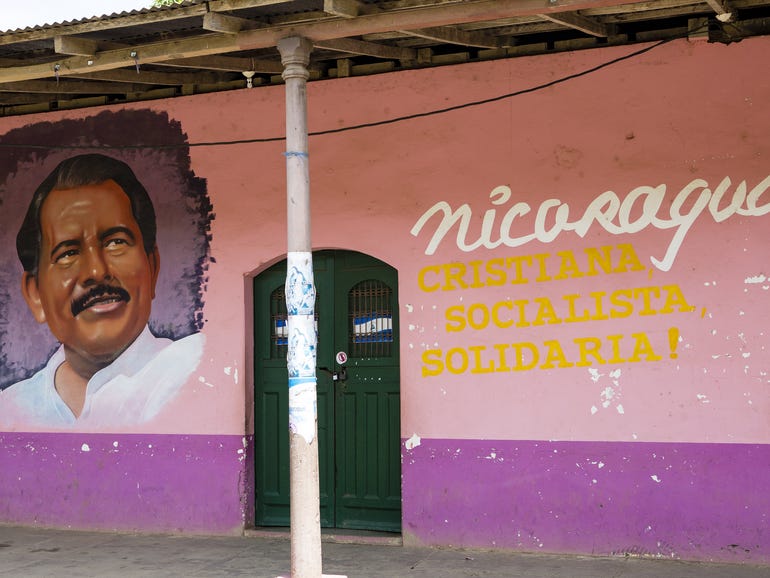
Facebook targets Nicaraguan government for alleged ‘troll farm’ campaign
Last Updated on January 8, 2023 by Admin
[ad_1]
Facebook announced on Monday that it shut down a “troll farm” allegedly run by the government of Nicaragua and the Sandinista National Liberation Front (FSLN) party. Nicaraguan President Daniel Ortega is vying for a fourth consecutive term in an election on Sunday.
The company — which recently adopted the new name of “Meta” — made the announcement in its “October 2021 Coordinated Inauthentic Behavior Report.”
Facebook says that in October, it removed 937 Facebook accounts, 363 Instagram accounts, 140 pages and 24 groups connected to the campaign. All of the accounts, pages and groups were allegedly connected to people in Nicaragua.
They called it “one of the most cross-government troll operations we’ve disrupted to date,” and said multiple state entities were involved.
“This operation targeted domestic audiences in that country and was linked to the government of Nicaragua and the Sandinista National Liberation Front (FSLN) party. We found one portion of this network through our internal investigation into suspected coordinated inauthentic behavior in the region, and another portion — as a result of reviewing public reporting about some of this activity,” Facebook said.
“Our teams continue to focus on finding and removing deceptive campaigns around the world — whether they are foreign or domestic. We know that influence operations will keep evolving in response to our enforcement, and new deceptive behaviors will emerge. We will continue to refine our enforcement and share our findings publicly. We are making progress rooting out this abuse, but as we’ve said before — it’s an ongoing effort and we’re committed to continually improving to stay ahead.”
Facebook defines “coordinated inauthentic behavior” as attempts to “manipulate public debate” through fake accounts.
The company claims it is working to stop campaigns run by governments and non-governmental groups, adding that it watches for “efforts to re-establish a presence on Facebook by networks we previously removed.” They use manual and automated tools to detect the campaigns.
“The use of government employees and infrastructure to run large-scale, cross-platform troll operations is an especially troubling trend: this year alone, we have taken down government-linked CIB networks in Ethiopia, Uganda, Sudan, Thailand and Azerbaijan,” Facebook said.
Facebook did not respond to questions about why they identified and spotlighted this specific campaign considering the many similar campaigns run by government actors in dozens of countries. The Nicaraguan government and FSLN also did not respond to requests for comment.
Facebook’s IO Threat Intelligence Team, led by Luis Fernando Alonso and Ben Nimmo, claimed in a report that the campaigns began in April 2018.
“It was primarily operated by employees of the Nicaraguan Institute of Telecommunications and the Post (TELCOR), working from the headquarters of the postal service in Managua.
“Additional smaller clusters of fake accounts were run from other government institutions, including the Supreme Court and the Nicaraguan Social Security Institute. This campaign was cross-platform as well as cross-government. It ran a complex network of media brands across Facebook, Tiktok, Instagram, Twitter, YouTube, Blogspot and Telegram, as well as websites tied to these news entities. They posted positive content about the government and negative commentary about the opposition, using hundreds of fake accounts to promote these posts.”
The Facebook team noted that this campaign was “distinct from financially-motivated clickbait content farms which don’t necessarily rely on fake accounts, but rather use Pages and Groups to post clickbait to drive people to off-platform websites and other channels to monetize.”
The campaign purportedly began in response to student-led nationwide protests and allegedly involved spreading information that “focused on discrediting the protesters, dissemination of false information and mass reporting of people opposing the government.”
According to Facebook, the effort switched from criticizing protesters to promoting the government’s work in the country.
The pages involved in the campaign had about 585,000 followers and nearly 74,500 joined the groups involved. About 125,000 accounts followed the Instagram accounts involved, according to Facebook.
The campaign also involved coordinated attempts to report the posts and pages of government critics to Facebook as a way to have them taken down.
“These included activists, independent media outlets and regular members of the public who had criticized government policies. Our review of these reports suggests that the great majority were rejected,” Facebook said.
“In at least one case, the network tried to get a series of posts that exposed its activity taken down, including photos of an apparent troll facility inside the TELCOR building in Managua. This attempt, too, failed. Despite being mostly unsuccessful, this tactic highlights how the organization sought to control the information environment of everyday Nicaraguan citizens. Although the operators posed as regular citizens of Nicaragua, our investigation found that much of the activity was operated from government-linked entities in Managua, including TELCOR.”
Facebook continues to face withering backlash for its failure — or in some cases complicity — in relation to government campaigns using the platform for nefarious purposes.
Former Facebook employee Frances Haugen leaked thousands of documents showing that Facebook has markedly different moderation policies in different parts of the world and that CEO Mark Zuckerberg specifically made decisions based on politics as opposed to the best interest of users and the public, like censoring anti-government posts in Vietnam and opposing publishing Spanish-language voting information in the US.
[ad_2]
Source link




